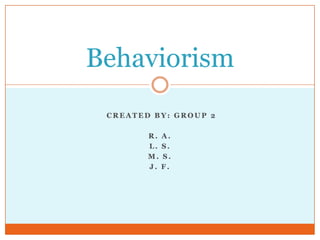
Behaviorism powerpoint
- 1. Behaviorism CREATED BY: GROUP 2 R. A. L. S. M. S. J. F.
- 2. Key Points of Behaviorism Theories Behaviorism is the view that assumes to learner is passive and responds to stimuli Pavlov created the theory of Classical Conditioning. - Classical Conditioning is based on Stimulus response. - Discovered by testing on dogs, learning the UCS and UCR, then through manipulation creating US and UR. Skinner created the Operant Conditioning theory. - Theory is based on controlled behavior that shapes the behavior through reinforcement. - Taught pigeons to dance through operant conditioning. - Theory based on positive and negative reinforcements.
- 3. Key Points of Behaviorism Theory Bandura’s made way for the social cognitive theory. - explains human behavior in terms of continuous reciprocal interaction between cognitive, behavioral, and environmental influences. - observational modeling - self- efficacy
- 4. Key People Ivan Pavlov (1849-1936) Russian physiologist Won a noble prize for dog digestion which started his exploration into studying behavior In his research he studied what he considered to be “psychic reflexes” Originated the study of Classical Conditioning Work later continued on by John B. Watson.
- 5. Key People B.F. Skinner (1904-1990) Coined the term for Operant conditioning from tests on conditioning or rats Studied Psychology and Physiology at Harvard which lead to some of high early experimentation Use of pigeons during an WWII project lead to further research Became a well known writer of his work and worked as a professor for both Harvard and Indiana University His work lead became a basis for educational software in later years.
- 6. Key People Albert Bandura (1925- present) Coined for the renamed Social Cognitive Theory Originally from Canada, but later moved to the United States and received his PhD from the University of Iowa Most famous for his Bobo doll experiment testing aggression. Known as Father of Cognitive Theory Former president of the American Psychological Association His work focused on the basis and analysis motivational factors.
- 7. Behaviorism Applied to our own Teaching Works in favor of both the teacher and the student Educational Games: Enhance new learning in a fun way Receive instant feedback PowerPoint Quizzes/Games: Teacher creates a game or quiz for the students to do If they answer the question correct, they get to move on (POSITIVE REINFORCEMENT) If they answer incorrect, they must go back and try again (NEGATIVE REINFORCEMENT)
- 8. Behaviorism Related Activities for the Classroom Checking students homework/class work regularly Provide encouraging feedback (or negative feedback if necessary) Drills: Flashcard drills Matching drills Etc. Progress of Behavior: Chart with “star” stickers to indicate good behavior
- 9. Classroom Implications In the Behaviorism classroom setting all of the students actions result in a consequence (good or bad). The good consequences can be identified as negative and positive reinforcement. Bad consequences are identified as punishments. Punishment Providing punishments in return for poor behavior Examples of what teachers may do without technology: -Late assignments are given a grade of “0” -Three tardies to class results in a call to the student’s parents -Failure to do homework results in after school detention ___________________________________________________ Students Students when faced with this system of rewards and punishments will adjust their behavior accordingly. Undesired behaviors that are punished and ignored will typically no longer be present.
- 10. Classroom Implications Negative Reinforcements Rewarding good behavior by removing consequences that the student finds unpleasant Examples of what teachers may do without technology: -Obtaining a score of 80% or higher makes the final exam optional -If no assignments are missing the lowest grade will be dropped -Good participation in class is rewarded with a “homework pass” Positive Reinforcements Rewarding good behavior with things that the student enjoys Examples of what teachers may do without technology: -Letting students know that they are doing a good job -Telling the student’s parents what exceptional work he/she has done -Selecting students to receive special recognition for their hard work in the class (through awards and prizes) -Smiling after students behave in an appropriate manner or answer questions correctly
- 11. Classroom Implications Behaviorism and Technology Computer based tests and practice tutorials that offer individual feedback and instruction help encourage students learning through correction and positive reinforcements. When students are rewarded with an encouraging comment or image such as “Good job!” before moving on to the next online learning objective they are more likely to try to achieve the same results. Students Students are easily influenced by this style of technology in the classroom because it reflects the video games of todays society in which the player is progressively rewarded as each level of the game is mastered. In an essence this style of learning becomes a “game” to the students so that they may remember it better.
- 12. Citations IMAGES: http://www.quido.cz/osobnosti/pavlov.htm http://www.leksikon.org/art.php?n=2324 http://www.infoamerica.org/teoria_imagenes/bandura3.jpg http://www.shanekula.com/devpsych/wp-content/uploads/2011/06/0.jpg http://movingagain.com.au/interstate/wp-content/uploads/2013/01/great-job.jpg http://tracemypreps.com/wp-content/uploads/2013/01/stop-go-back-try-again.jpg http://teachers.saschina.org/lwang/files/2012/10/starstudent.jpeg CONTENT: http://www.learning-theories.com/classical-conditioning-pavlov.html http://www.bfskinner.org/bfskinner/AboutSkinner.html http://www.criminology.fsu.edu/crimtheory/bandura.htm http://www.criminology.fsu.edu/crimtheory/bandura.htm http://lonnieashton.edublogs.org/2010/03/22/behaviorism-in-practice/ http://viking.coe.uh.edu/~ichen/ebook/et-it/behavior.htm http://thestrategyroomblog.com/wp-content/uploads/2011/08/Good-job-275x300.jpg